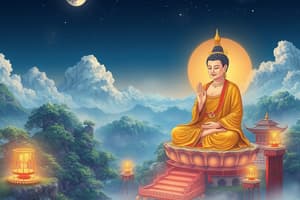Podcast
Questions and Answers
In Confucianism, what leads to the development of goodwill, sympathy, politeness, and generosity?
In Confucianism, what leads to the development of goodwill, sympathy, politeness, and generosity?
- Heart of compassion (correct)
- Heart of wisdom
- Heart of righteousness
- Heart of propriety
According to Confucianism, what is the main focus of the quest for the human self?
According to Confucianism, what is the main focus of the quest for the human self?
- Body
- Personality (correct)
- Environment
- Spirituality
What does Taoism emphasize as the goal of life for each individual?
What does Taoism emphasize as the goal of life for each individual?
- Pursuing self-interest
- Material gain
- Finding one's own personal adjustment to the natural world (correct)
- Achieving social status
Which virtue in Confucianism focuses on displaying respectability, decency, and conformity to accepted standards?
Which virtue in Confucianism focuses on displaying respectability, decency, and conformity to accepted standards?
What is the central concept in Taoism that is interpreted as a return to the natural world?
What is the central concept in Taoism that is interpreted as a return to the natural world?
What are the three characteristics of all existence according to Buddhism?
What are the three characteristics of all existence according to Buddhism?
Which of the following is NOT one of the four noble truths in Buddhism?
Which of the following is NOT one of the four noble truths in Buddhism?
What is the Sanskrit term for 'attachment' in Buddhism that is identified as a cause of suffering?
What is the Sanskrit term for 'attachment' in Buddhism that is identified as a cause of suffering?
How many factors is an individual compounded of according to Buddhism?
How many factors is an individual compounded of according to Buddhism?
What are the eight components of the path to the cessation of suffering in Buddhism called?
What are the eight components of the path to the cessation of suffering in Buddhism called?
Flashcards are hidden until you start studying
Study Notes
Buddhist Doctrine
- Anatta, or non-self, is a central concept in Buddhism, meaning that there is no permanent, underlying substance that can be called the soul.
- The individual is compounded of five constantly changing factors.
- The three characteristics of all existence are anatta, anicca (impermanence), and dukkha (suffering).
- Recognition of these three doctrines constitutes "right understanding".
Four Noble Truths
- Existence is suffering (dukkha).
- Suffering has a cause, namely craving and attachment (trishna).
- There is a cessation of suffering, which is nirvana.
- There is a path to the cessation of suffering, the eightfold path.
Eightfold Path
- Right views
- Right resolve
- Right speech
- Right action
- Right livelihood
- Right effort
- Right mindfulness
- Right concentration
Characteristics of Buddhism
- Reality is described in terms of process and relation rather than entity or substance.
- Many forms of Buddhism exist around the world, each revering certain texts.
Confucianism
- Confucianism is a societal philosophy rather than a religion.
- It believes in the golden rule: "Do not do unto others what you do not want others to do unto you."
- The quest for the human self is focused on the personality.
- Personality is seen as being formed through upbringing and environment.
- Every person is born with four beginnings: compassion, righteousness, propriety, and wisdom.
- These beginnings can lead to the development of virtues such as Jen, Yi, Li, and Chih.
Virtues in Confucianism
- Jen: compassion, goodwill, sympathy, politeness, and generosity.
- Yi: rightness, respect of duty, and guardianship towards nature and humanity.
- Li: respectability, decency, and conformity to accepted standards of behavior and morality.
- Chih: wisdom brought about by practicing Jen, Yi, and Li.
Taoism
- Taoism is based on the writings of Laozi, who lived around 2,500 years ago.
- The focus is on the Dao (Tao), "the way", which is interpreted as a return to the natural world.
- The Dao is composed of Heaven, Earth, and Humanity.
- Taoist practices emphasize selflessness, simplicity, and modesty.
- The goal of life is to find one's own personal adjustment to the rhythm of the natural and supernatural world.
- Taoists stress the importance of harmonizing with nature by balancing yin and yang.
Studying That Suits You
Use AI to generate personalized quizzes and flashcards to suit your learning preferences.




